For years Martin starring John Amplas was one of the hardest of George "Night of the Living Dead" Romero's films to track down. When it was a relatively new film, it became one of my favorites, but for decades I was never able to catch it again. When it reached DVD, it was so grand to discover it more than holds up after all this time.
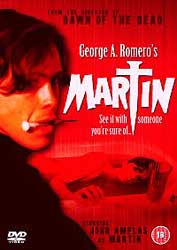 Martin's vampire is not the fanged supernatural being of cliche vampire cinema, but on the other hand he's apparently a great deal older than his youthful appearance conveys. And certainly Martin's only half-crazy uncle is convinced his nephew is nosferatu. Martin's vampire is not the fanged supernatural being of cliche vampire cinema, but on the other hand he's apparently a great deal older than his youthful appearance conveys. And certainly Martin's only half-crazy uncle is convinced his nephew is nosferatu.
The ambiguity about what vampirism really means, & whether Martin is more than a deviant self-deluding sociopath, becomes a central feature of the story with both literal & symbolic meaning.
He's shy around women & has spent most of his career as a vampire preying upon them as his only way of relating. But he feels guilty about his behavior & strives to amend his ways. As he does need blood to survive, he attempts to overcome any sexual sublimination in his need for blood, & has begun to prey upon the unwanted homeless.
He befriends a depressed woman whose husband, though not a bad guy, is pretty much destroying the unhappy woman's life. Her friendship with Martin is all that keeps her from suicide, for a while at least. The film seems actually to ask "Who is the real vampire here? Blood-drinking Martin, or a soul-sapping standard-issue husband, or society itself?"
On some level it could almost pass for a feminist slasher asserting that society is infused with vampirism of a cultural type that foremost victimizes women. Certainly in the context of all the kill-the-girls-slowly slashers of its decade or even now, Martin has always stood apart as something altogether different & vastly more thoughtful with an unexpected sense of sorrow & humanity.
It is a minimally budgeted film, but as "quiet horror" it is high-end stuff, looking more cinema verite than cheapo, & as such one of Romero's best films for all that it has been under-appreciated. The climax is such a sad & unexpected miscarriage of justice that it comes off as a very fine tragedy instead of merely low-budget horror, & one of the great achievements for the horror genre in 1970s cinema.
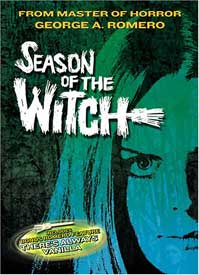 Season of the Witch aka Jack's Wife aka Hungry Wives (1972) starts off with a pokerface satire, a host or guide showing Joan (Jan White) through the elements of life, as she catches herself in mirrors having aged & died in the sorry-ass suburbs. Season of the Witch aka Jack's Wife aka Hungry Wives (1972) starts off with a pokerface satire, a host or guide showing Joan (Jan White) through the elements of life, as she catches herself in mirrors having aged & died in the sorry-ass suburbs.
As a stay-at-home wife overcome with soul-crushing bordom & dreams of confusion & woe, Joan tries to escape the suburban tradition of being barely alive. She begins to pursue an interest in witchcraft.
This is close to being the feminist version of such retro entertainment as Bewitched (1964-1972) or Bell Book & Candle (1958). In a world that undervalues, underestimates, & under utilizes women; or in a Stepford Wives type neighborhood, Joan throws out her anti-depressants & begins to acquire power.
Acting-wise, everyone seems to be on benzedrine, & monotone dialogue extends the sense of the cast being either amateurish or clinically depressed. The slow tedium is spiced up with the weird dreams. The dreams are more interesting than the waking narrative, though being stalked by a guy in a halloween mask does not become less cliche or more suspenseful for being only a dream.
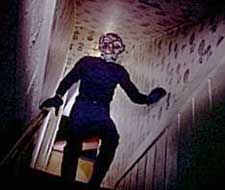 If it weren't a George Romero film it'd be dismissed out of hand as foolish, too much of it being little more than a gibbering soap opera, a precursor to Desperate Housewives. But knowing full well that Romero is a grand talent & no fool, it makes one want to look for more to Season of the Witch. If it weren't a George Romero film it'd be dismissed out of hand as foolish, too much of it being little more than a gibbering soap opera, a precursor to Desperate Housewives. But knowing full well that Romero is a grand talent & no fool, it makes one want to look for more to Season of the Witch.
When she first set out to change her life, it began with a shopping binge such as she had already relied on to perk up her drab life. But this time she shops for witchcraft supplies while Donovan's annoying song "Season of the Witch" blares on the soundtrack.
The rituals she performs are rather banal but make her feel empowered. She uses this new sense of power to get laid by a guy who wanted to lay her anyway. It would appear Joan is only imagining her spells have any value.
The biggest mystery here is whether or not any of it is going to turn out to be real, or if Romero is only going to de-mystify witchcraft in the same way he de-mystified vampirism as mere psychological state in Martin.
Unfortunately, unlike Martin, the characters of Season of the Witch aren't rich enough to be worth watching in their own right.
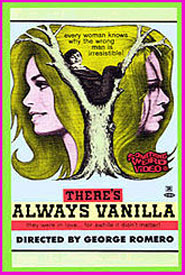 George Romero has been such a significant director in my horror-fan & film-going life that I've wanted to see even the least of his films, & now I have. There's Always Vanilla; aka, The Affair (1971) was included on the "flipside" of a dvd release of Season of the Witch as one of the disc's many extras.
George Romero has been such a significant director in my horror-fan & film-going life that I've wanted to see even the least of his films, & now I have. There's Always Vanilla; aka, The Affair (1971) was included on the "flipside" of a dvd release of Season of the Witch as one of the disc's many extras.
At the time Romero, having gotten unexpected attention for his first film Night of the Living Dead (1968), was a mite reluctant to become typecast as a horror director. So he dipped into the shallow end of the pool for a romantic comedy. It's a not a good film at all, with a script both inane & confusing by Rudi Ricci, so that Romero resorted to the last-minute addition of "narrative voice over" to explain what's going on.
The emotionless voice-over makes up for the visuals failing from time to time to tell it right, but just as often the voice-over wasn't necessary, the "fix" having been taken much further than needed.
In one of the dvd's extras, Romero admits he has no liking for the film, & rarely even speaks of it, thinking of it, if at all, as really much more Rudi Ricci's film. Inspired by the likes of Goodbye Columbus (1969), or John & Mary (1969), it strives to be urbane & sexy with a bit of the hippy era tossed in.
A soundscape marred by electronic & rock & folk-pop fits the era, but is nevertheless annoying to hear. As a relic of the early '70s though, it might bare some merit for cultural studies of a passing era in America.
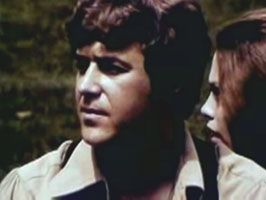 Our hero Chris (Raymond Laine) is a studio musician "tired of hearing myself on other people's records." He sets out on his drifter's mission of self-liberation or something like that, arriving in Pittsburg, hooking up with an old girlfriend. Our hero Chris (Raymond Laine) is a studio musician "tired of hearing myself on other people's records." He sets out on his drifter's mission of self-liberation or something like that, arriving in Pittsburg, hooking up with an old girlfriend.
For a moment it feels like it might get interesting merely because the girl's name is Terri Terrific (Johanna Lawrence). Her name is the first & alas the only imagnative thing in the film.
Chris soon meets "the chick," a beauty who makes television commercials. Lynn (Judith Ridley nee Judith Steiner) has wit & intelligence, criticical of the whole world of advertising. But possessing intellect is not what gets her the rewards. She, too, seeks some kind of liberation, though what it amounts to is an idle & tediously romantic affair, with Lynn essentially supporting her sponging boy-toy.
He could get a full time job at any moment because his father (Roger McGovern) owns a babyfood business, but if it was a choice of being a paid stud or ente4ring factory management, which sounds better? Well, it could be argued, succeeding as a bum is hard work, too.
Their entire romance struck me as awful, but then I'm not generally fond of even fairly decent romantic comedies, unless they transcend their genre, as did The Graduate (1967) or Four Weddings & a Funeral (1994), or some vintage screwball romances akin to, oh, perhaps His Girl Friday (1940) or It Happened One Night (1934). Unfortunately, There's Always Vanilla is at best underwhelming rather than transcending, & such ordinary fare never holds up for me.
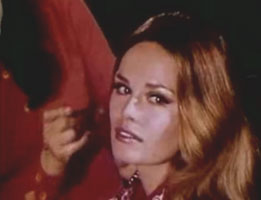 Near the end it goes all serious as though it had an important statement to make about abortion, in days when women did not have the legal right to make that choice. Our heroine descends into a purgatorial world of tabletop amateur surgery, escaping in the nick of time to live, instead, a boring life with a boring man void of compassion but respectable & wealthy. Near the end it goes all serious as though it had an important statement to make about abortion, in days when women did not have the legal right to make that choice. Our heroine descends into a purgatorial world of tabletop amateur surgery, escaping in the nick of time to live, instead, a boring life with a boring man void of compassion but respectable & wealthy.
A specific message is thankfully avoided, though the tone of the thing does seem to come down on the side of a life of misery being the lesser of evils, abortion being the greater.
The more certain message is in the title, "There's always vanilla" meaning Lynn could always fall back on being a housewife & mother to some crushing but responsible bore, & Chris could always count on his daddy to give him an unearned management position with good pay. Thus neither needs to remain care free evading the life-sapping snares of a responsible conformity.
Until the misguidedly serious conclusion, the film feels like it wanted to burst into a semi-artsy softcore porn, but simply lacked the guts for more than the amount of booby most drive-in cheapies had at the time.
The acting is uneven, but the two leads are at least adequate. It's in the main all about the dialogue & tries on some level to be a serious film about a seemingly easy affair & its repurcussions chiefly for a woman. I was never induced to care. If you, however, like films akin to Goodbye Columbus, which bore the shit out of me, then There's Always Vanilla may captivate you.
copyright © by Paghat the Ratgirl
|

 Martin's vampire is not the fanged supernatural being of cliche vampire cinema, but on the other hand he's apparently a great deal older than his youthful appearance conveys. And certainly Martin's only half-crazy uncle is convinced his nephew is nosferatu.
Martin's vampire is not the fanged supernatural being of cliche vampire cinema, but on the other hand he's apparently a great deal older than his youthful appearance conveys. And certainly Martin's only half-crazy uncle is convinced his nephew is nosferatu.
 If it weren't a George Romero film it'd be dismissed out of hand as foolish, too much of it being little more than a gibbering soap opera, a precursor to Desperate Housewives. But knowing full well that Romero is a grand talent & no fool, it makes one want to look for more to Season of the Witch.
If it weren't a George Romero film it'd be dismissed out of hand as foolish, too much of it being little more than a gibbering soap opera, a precursor to Desperate Housewives. But knowing full well that Romero is a grand talent & no fool, it makes one want to look for more to Season of the Witch. 
 Our hero Chris (Raymond Laine) is a studio musician "tired of hearing myself on other people's records." He sets out on his drifter's mission of self-liberation or something like that, arriving in Pittsburg, hooking up with an old girlfriend.
Our hero Chris (Raymond Laine) is a studio musician "tired of hearing myself on other people's records." He sets out on his drifter's mission of self-liberation or something like that, arriving in Pittsburg, hooking up with an old girlfriend. Near the end it goes all serious as though it had an important statement to make about abortion, in days when women did not have the legal right to make that choice. Our heroine descends into a purgatorial world of tabletop amateur surgery, escaping in the nick of time to live, instead, a boring life with a boring man void of compassion but respectable & wealthy.
Near the end it goes all serious as though it had an important statement to make about abortion, in days when women did not have the legal right to make that choice. Our heroine descends into a purgatorial world of tabletop amateur surgery, escaping in the nick of time to live, instead, a boring life with a boring man void of compassion but respectable & wealthy.